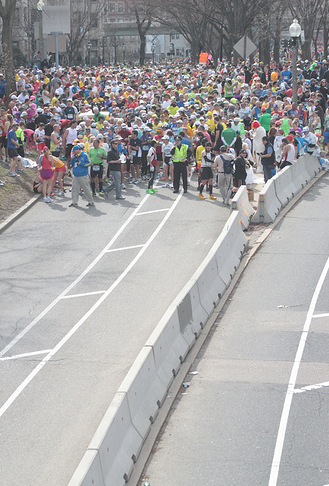By Caitlin Walsh, News Staff
Nearly five months have passed since the April 15 Boston Marathon bombings and the subsequent manhunt and shutdown of an entire city. This past weekend, a new flood of students moved into Northeastern who were receiving acceptance letters and putting down deposits at the time of the attacks. Older students, most of whom left in a time of chaos, are now returning to the city.
Third year political science major Valerie Courtney was right near the site of the second explosion, by Lord & Taylor on Boylston Street.
“I heard something go off, and everyone wondered if it was a cannon,” Courtney said. “It was scary; you never think it would happen. And especially when you don’t know what’s going on and everyone is in a panic.”
Students on the day of the attack were sent an email from the president’s office, offering support and comfort. On the Friday of the manhunt and city lockdown, they were alerted by text and email of finals being postponed and were told not to leave where they were unless absolutely necessary. Every attempt to ensure safety was made, which many students appreciated and needed, and to this day are comforted by.
“I felt safe, even when I went to go get food on Friday,” Courtney said. “I felt safe being outside because there were police everywhere. I got the alerts on my email and phone.”
Freshman political science major Keilani Lai-Hipp, who only two days before the attack had put down her deposit to come to Northeastern, knew she’d be safe coming here.
“I always see NUPD walking around and cruisers going by,” Lai-Hipp said. “As much of a hassle as it is to swipe my Husky Card three times before I can get into my room, this university seems constantly alert and determined to keep its students safe.”
The university continues to strive to support the community in the aftermath of the attacks, and went so far as to ban the July Rolling Stone issue with suspected bomber Dzhokhar Tsarnaev on the cover. The controversial issue was banned by many store chains as well as Northeastern — a decision that junior business major Victoria McGrath, who was injured in the bombing, was especially supportive of.
“The Rolling Stone’s decision to put a terrorist on the cover of their magazine was horrific,” McGrath said of the issue featuring the face of a man who haunts her.
“It isn’t fair that Rolling Stone decided to put this criminal on their cover and throw one more obstacle in the faces of the victims. This is why I feel that it was a mature decision of CVS, Walgreens, Northeastern and other businesses to refuse to sell the issue. This makes me feel like these businesses deserve my loyalty. It is the survivors that deserve the love and attention, and these businesses focused on and supported us instead of a terrorist. “
McGrath was at the site of the first explosion with a few friends of hers when shrapnel from the pressure cooker bomb severed her femoral artery, multiple tendons, muscles, nerves and broke her fibula bone. After her extensive injuries, the school was extremely attentive and supportive of not only her, but also a friend, and fellow Northeastern student, who was with her.
“Northeastern University has been exceedingly supportive and helpful to me and my friend Krystara Brassard, so I am not shocked that the university would decide to keep aiding us to get through this time and avoid this terrible man and what he caused,” McGrath said. “President Aoun has gone above and beyond for me and Krystara. I know that he and his team are doing everything in their power to keep us from harm and ease our transition back into our old lives.”
Boston rallied together in the days following the attack and “Boston Strong” shirts and signs are still being sold now. The feeling of community extends beyond long time residents: students said they feel more at home than ever, as a result of the camaraderie.
“I felt closer to Boston after it happened,” Courtney said. “You don’t mess with Boston ‘cause we will shut down everything and find you. It made me feel proud to live in Boston. It was definitely weird the first week, but I really felt part of the community.”









